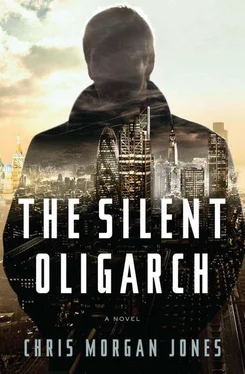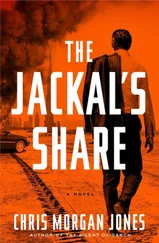By five he was beginning to think that he wouldn’t hear from Nina that day. Perhaps she had left early that morning for the university and hadn’t seen his note. He had made no clear agreement with himself about how long to stay in Berlin. He was due to fly to Paris to see Onder the following evening but he might well change it; the arbitration would go on all week and Onder would be there for much of it. If Nina didn’t respond should he see Prock? Against every instinct he probably should. He decided that he would write another note, and deliver it to Prock’s office so that he would have it the following morning. He delivered it that evening on his way to dinner.
A little before nine his phone gave a short chime to tell him that he had a text message. Mr. Webster. Please come to my apartment at 9:00 a.m. tomorrow morning. Thank you. Nina Gerstman. So she was there. He realized at that moment that he would find it far easier to talk to Prock.
HE WOKE EARLY. By eight he had showered, shaved and dressed in a dark navy suit, white shirt and dark blue tie. Today was a day to look as grave as possible. As he left the room he looked at himself in the mirror. Was that the face he deserved? It looked honest enough to him, but he could hardly judge. His eyes were brown and candid, with specks of green and black; his hair, silver for years now and cropped short, suggested serious, responsible. There were enough flaws in his face to make it somehow convincing: a short scar on his chin where his beard didn’t grow, the nose not quite straight. He was plausible, certainly. But it was one thing to convince people that you were trustworthy, and quite another to deserve their trust.
At nine he stood outside Nina’s building and rang the doorbell for Flat 12. The sky was still dull. While he waited he looked through the glass doors into the entrance hall, cupping his hands around his eyes to keep out the light. Stone stairs, an art nouveau balustrade, an intricate tiled floor, marble lining the walls up to shoulder height. A woman’s voice asked him who he was and buzzed him in. An old lift in its iron cage took him up to the fourth floor and as he pulled the concertina gate back Nina was waiting for him.
She wasn’t what he had expected. His research had discovered that she was an academic, a physicist who lectured at Humboldt University, and he had pictured her as small and somehow scientific—glasses perhaps, mousy hair and practical clothes. In fact she was tall, almost his height, and dark, her eyes black and childishly full in a narrow face. She stood with her legs slightly apart, her calves full, her feet turned out like a dancer, and she wore black: a black skirt, black stockings and shoes, a black cardigan over a gray blouse. Webster realized that he hadn’t been with someone in mourning since his grandfather had died ten years earlier.
“Frau Gerstman.” He found himself giving a slight bow of the head.
“Mr. Webster.”
“Thank you for seeing me. I hope I’m not intruding.”
Nina said nothing but gestured for him to follow her into the apartment. They walked down a long corridor with doors on either side, all closed. The floor was golden parquetry, and on the walls hung a series of color photographs of the modern buildings of Berlin: the Neue Nationalgalerie, the revived Reichstag, several buildings that Webster didn’t recognize. They were good, and he wondered whether Nina had taken them. Or Gerstman.
The corridor opened into a bright sitting room at the far end of the apartment with large windows on two sides. Here there were no photographs but many paintings, abstracts and portraits, hung in clusters.
“Would you like something to drink, Mr. Webster?” asked Nina. Her voice was low and dry. Webster thanked her, but no, he was fine. She sat down, quite upright at the front of a deep sofa, and Webster sat opposite in an armchair. On the glass table between them were sales catalogues for auctions of modern art in London and Paris. His chair was low and he struggled to find an attitude that seemed appropriate.
Nina looked at Webster. I wonder what she sees, he thought. In the light her face was pale but for the skin under her eyes, which was a deep purple gray.
“Thank you for seeing me. I’m grateful,” he said.
“I wanted to see you.”
“I wanted to say first how… how sorry I was to hear your news.” The words sounded thin and brittle as he said them.
“Thank you.”
“I heard it from your husband’s partner. He called me. He told me that…” He hesitated. “He suggested that my meeting with Dmitry might have brought about his death.”
Nina said nothing.
“It wasn’t my intention to cause anybody harm.”
Again, Nina didn’t reply, but looked at him steadily all the while. She was composed; Webster felt wholly uncomfortable. He couldn’t tell whether she was resigned or calmly furious. Eventually she said, “I don’t know why he died, Mr. Webster. I would like the Hungarians to tell me but I think they will not.” She paused. “Why do you think he died?”
“In a sense I barely knew him. I’m probably the last person who should say.” Webster shifted his position.
“But what do you think?”
“I have a sense that he was murdered.”
“Why do you say that?”
“Because of what I hear from Hungary. Because it was a very strange way to… to end it. Because the Hungarians seem to have been quick to make up their minds.”
“I have the same sense. But I would like to know.”
“So would I.”
Nina had her hands clasped in her lap. She loosened them and scratched her forearm lightly.
“That is what I want to know from you, Mr. Webster. Why you want to know. In a way this is not your business. You met Dmitry once. You did not know him.”
Webster had anticipated this. He had an answer prepared, but now it hardly seemed adequate. As he began, a mobile phone began to buzz across a table in the corner of the room.
“Excuse me.” Nina stood and went to pick it up. “Gerstman.” She walked into the corridor, speaking softly. Webster could still make out what she was saying. The person on the other end of the call talked more than she did. “Ja,” he heard her say. “Nein, nicht jetzt. Ich bin nicht allein. Ja.” A long pause. “Das geht Sie nichts an. Ich wollte ihn sehen.” Webster’s German was still good enough to make some of this out. That’s not for you to say. I wanted to see him. “Ja, mir geht es gut. Morgen vielleicht. Oder Mittwoch. Ja. Auf Wiedersehen. Auf Wiedersehen.”
Nina came back into the room and sat down, putting the phone on the glass table in front of her.
“I’m sorry,” she said. “Just a friend.”
“You must tell me if you’d like me to go.”
“No, it’s OK.”
“Thank you.” Webster chanced what he hoped was a sympathetic smile; Nina did not return it. Her face was hard to read. It was stony, set, but not in anger; there was something else there. He tried again. “You asked me why I’m still interested. I’d like to stop the man responsible.”
Nina nodded. “And why are you here?”
He had anticipated this too. “I’m here because… I’m here to say sorry, for anything I might have done.”
“In my work, Mr. Webster, it is understood that you cannot see a thing without changing it. It is impossible to simply be an observer. So you have played a part, whatever it might be.”
“That’s true.”
“I will be open with you. I am not interested in what you did. Dmitry was never free of Russia. It followed him here. I do not think you brought it. He tried to stop it. He took out insurance. He was very careful. My only interest, all I want to do…” For the first time she looked down at her hands. “All I want is to know how he died.” Tears formed in her eyes. She wiped them away with the back of her hand and sat for a moment looking away from Webster, out of the window to the rooftops beyond. She took a deep breath and went on. “I do not know whether they are paid to stop investigating, or whether they do not care to. It must be a… how do you say it… it must be annoying to have a dead Russian from Berlin in your city.” She paused for a moment and looked at him. “But it is not logical. I know he did not send me that e-mail. I know it.” She leaned forward, rested her forehead in her hands and sat gently shaking her head.
Читать дальше












